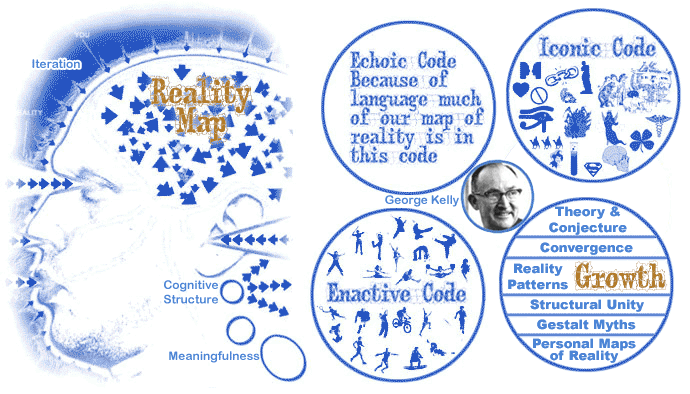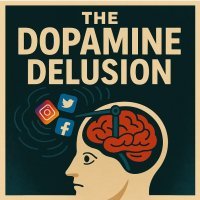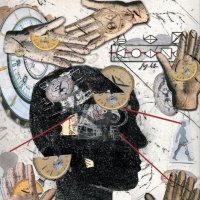Personal Construct Psychology
Understanding How Your Inner Map Of Reality Is Created
Here's the "software" reason why you think the way you do

What Is Personal Construct Psychology
Personal construct psychology, developed by George Kelly and first published in 1955, is based on Kelly’s theory of personality.
At root, Kelly's theory is built on the concept of "Man as Scientist" – that is, we each seek to make sense of the world as we experience it by building and testing hypothesis about how the world works.
Expressed in more modern language, we all create our own inner map of reality (or construct) based on the filters of our own ethnic, national, social and religious backgrounds, and we interpret and experience life from the perspective of that map.
Thus, according to Kelly our constructs (or inner map of reality) serves the dual purpose of representing our view of life and providing indicators or how we are like to interpret life as we continue to experience it.
Personal construct psychology also considers whether and how we might modify our constructs when faced with contradictory information – in other words establishing our ‘core constructs’ (core beliefs) that are more likely to be “non-negotiable”.
Personal Construct Psychology - Summary Of Main Points
The main points of personal construct psychology can be summarised as follows:
Our construct systems make our world more predictable
We use our construct systems to make the world easier to find our way around. They reflect our constant efforts to make sense of our world, hence Kelly’s “man as a scientist” analogy. Like the scientist, we observe, we draw conclusions about patterns of cause and effect, and we behave according to those conclusions.
Our construct systems can grow and change
Our constructs are confirmed or challenged every moment we are conscious. Whether we adapt or immunise depends on a number of things: how open we are to new information, how much it matters to us to maintain our core belief.
Our construct systems influence our expectations and perceptions
As our constructs reflect our past experience, they also influence our expectations and behaviour.
Some constructs, and some aspects of our construct systems, are more important than others
Those constructs that represent our core values and concern our key relationships - are complex, quite firmly fixed, wide-ranging, and difficult to change; others, about things which don't matter so much, or about which we haven't much experience, are simpler, narrower, and thus carry less personal commitment.
Your construct system is your truth as you understand and experience it - nobody else's
Our constructs represent the truth as we understand it. Construct systems are not objective measures of “truth”. When we meet someone whose construct system is different from our own - especially if we don't like it, or think it's “wrong” – we might try confronting them with opposing perspectives and evidence, and then we get frustrated when we see them immunising their constructs instead of adapting them. (This is the basic premise of Kegan and Lahey’s work in “Immunity to Change”).
Construct systems are not always internally consistent
We can and do live with a degree of internal inconsistency within our construct systems - but if the distortions of judgement become too costly or inappropriate we are likely to suffer some form of personal distress.
The extent to which one person can understand another's construct system is a measure of that person's empathy
We do not have to have the same construct system as another person in order to understand them; but we do need to be able to infer the other person's constructs (or as someone once said "walk a mile in his/her shoes").
Interpreting meaning in a construct via Kelly's Repertory Grid
George Kelly developed a technique known as “The Repertory Grid” for identifying the ways that a person construes (interprets/ gives meaning to) his or her experience and for providing information from which inferences about that persons’ personality can be made.
See also: The George Kelly Society - Repertory Grid Methods
Further resources
Books, journals and links etc:
The George Kelly Society - Resources
Return to: Managing Personal Change
LATEST ARTICLES
The Dopamine Delusion - Why Anticipation Beats Achievement
 The thrill we feel is not in the having, but in the wanting. The more we have, the more we want. The more things we acquire and the easier things get for us, the more discontent we feel. The more spo…
The thrill we feel is not in the having, but in the wanting. The more we have, the more we want. The more things we acquire and the easier things get for us, the more discontent we feel. The more spo…The Power Of Silence Is Experienced In Your Use Of Language
 Practise the "Beneficial Neurological Delay" for optimal comprehension. The power of silence is experienced in your use of language, specifically: - How you formulate the words you use to think and in…
Practise the "Beneficial Neurological Delay" for optimal comprehension. The power of silence is experienced in your use of language, specifically: - How you formulate the words you use to think and in…Dealing With Setbacks - 5 Questions To Help You Face Discomfort
 How To Counter The Cognitive Shock Of A Setback. Setbacks challenge your instinctual desire for control and comfort, making it unnatural to respond with calm or acceptance. The reason for these instin…
How To Counter The Cognitive Shock Of A Setback. Setbacks challenge your instinctual desire for control and comfort, making it unnatural to respond with calm or acceptance. The reason for these instin…Why Praxis Is The Key To Living A Successful And Stress Free Life
 Praxis Is The Process Of Taking Informed Action To take informed action you need to be prepared with information, knowledge, education and insight. Informed action is objective action that: - Seeks to…
Praxis Is The Process Of Taking Informed Action To take informed action you need to be prepared with information, knowledge, education and insight. Informed action is objective action that: - Seeks to…The Power Of Working With The Front Line
 How To Exercise Influence Without Authority In Complex Systems I first discovered the power of working with the frontline when I was working as a business troubleshooter on large projects, programmes…
How To Exercise Influence Without Authority In Complex Systems I first discovered the power of working with the frontline when I was working as a business troubleshooter on large projects, programmes…Dealing With Distraction - Learning How To Live With Your "Attention Autopilot"
 Living With Your Attention Autopilot The good news about your Attention Autopilot is that it will keep you safe. It is continuously scanning your immediate environment for threats. The bad news is tha…
Living With Your Attention Autopilot The good news about your Attention Autopilot is that it will keep you safe. It is continuously scanning your immediate environment for threats. The bad news is tha…The Time Of Your Life - Recognising Moments Of Alignment For Action
 How will you recognise your moment of alignment for action? In this article I want to look at our relationship with time and in the context of the two main themes of this site, firstly as a thinking s…
How will you recognise your moment of alignment for action? In this article I want to look at our relationship with time and in the context of the two main themes of this site, firstly as a thinking s…The Metagame Approach to Second Order Thinking - 5 Guiding Principles
 How To Position Yourself For Survival & Success In A Complex Environment We treat life as though it is a complicated system, and our thinking skills and mental models are focused on understanding its…
How To Position Yourself For Survival & Success In A Complex Environment We treat life as though it is a complicated system, and our thinking skills and mental models are focused on understanding its…Outcome Over Optics - Long Game Outcomes Over Short-Term Ego Gains
 The Day I Learned To Focus On Outcome Over Optics I have never forgotten the day I learned to focus on outcomes over optics and figured out a very simple way of saving myself several hundred thousand…
The Day I Learned To Focus On Outcome Over Optics I have never forgotten the day I learned to focus on outcomes over optics and figured out a very simple way of saving myself several hundred thousand…The ETTO Principle - Why Near Enough Can Be Good Enough
 How To Balance the Efficiency-Thoroughness Trade Off The ETTO Principle describes the inherent trade-off between working efficiently and working thoroughly. This trade-off is something that affects…
How To Balance the Efficiency-Thoroughness Trade Off The ETTO Principle describes the inherent trade-off between working efficiently and working thoroughly. This trade-off is something that affects…Master The Art Of Drawing The Bow
 Focus On Process Not Outcome In so many areas of our lives, we focus on the outcome, not the process that we follow to achieve it. In the western world, we are conditioned to pay less attention to how…
Focus On Process Not Outcome In so many areas of our lives, we focus on the outcome, not the process that we follow to achieve it. In the western world, we are conditioned to pay less attention to how…And So This Is Christmas
 There Is No Path To Peace - The Path Is Peace Thich Nhat Hanh, the renowned Vietnamese Zen Buddhist monk, teacher, and peace activist, often spoke about peace as a state of being that begins within on…
There Is No Path To Peace - The Path Is Peace Thich Nhat Hanh, the renowned Vietnamese Zen Buddhist monk, teacher, and peace activist, often spoke about peace as a state of being that begins within on…Curiosity Skilled The Cat - Optimize For Interesting
 Curiosity Fuels Excellence The old adage, “Curiosity killed the cat,” warns of the dangers of venturing too far into the unknown. But what if we reimagine it not as a risk but as a gateway to developi…
Curiosity Fuels Excellence The old adage, “Curiosity killed the cat,” warns of the dangers of venturing too far into the unknown. But what if we reimagine it not as a risk but as a gateway to developi…Let Stillness Speak - Living Within A Complex System
 To let stlllness speak is to learn it's first major lesson: you are not your thoughts. To let stillness speak is about stepping back from the constant chatter of your mind and allowing a deeper, quiet…
To let stlllness speak is to learn it's first major lesson: you are not your thoughts. To let stillness speak is about stepping back from the constant chatter of your mind and allowing a deeper, quiet…Understanding Complex Systems Thinking - It's Not Complicated
 Understanding, and being able to work with, complexity is an important thinking skill.
We are all working with complex systems, and we do so every day. The biggest one is life itself. We automaticall…
Understanding, and being able to work with, complexity is an important thinking skill.
We are all working with complex systems, and we do so every day. The biggest one is life itself. We automaticall…Stay On The Bus - When To Keep On Going
 The Helsinki Bus Station Theory
Have you ever started a new project, initiative or role with a big vision and a determination to make a difference? Initially you were full of enthusiasm and highly mo…
The Helsinki Bus Station Theory
Have you ever started a new project, initiative or role with a big vision and a determination to make a difference? Initially you were full of enthusiasm and highly mo…Zen Thoughts Email Series
 Conversations With A Friend Zen Thoughts is an email series of 50 short messages spread over 3 months. The messages are written in the style of a conversation with a friend who is going through a toug…
Conversations With A Friend Zen Thoughts is an email series of 50 short messages spread over 3 months. The messages are written in the style of a conversation with a friend who is going through a toug…How to Get What You Value by Changing What You Measure
 Give Up Control & Gain Influence To Get What You Want
The metrics we choose to focus on can significantly shape our outcomes, sometimes in ways we don't intend. The challenge is to make sure that you…
Give Up Control & Gain Influence To Get What You Want
The metrics we choose to focus on can significantly shape our outcomes, sometimes in ways we don't intend. The challenge is to make sure that you…How to Become A Master At Overcoming Hard Moments
 "The best in the world are not the best because they win every point. It's because they lose again and again and have learned how to deal with it." This quote from Roger Federer has got a lot of cover…
"The best in the world are not the best because they win every point. It's because they lose again and again and have learned how to deal with it." This quote from Roger Federer has got a lot of cover…Drop The Story - Deal With Your Demons and Transform Your Experience
 Are you living your life from the stories you tell yourself? Learning how to drop the story and deal with that voice in your head can be a game changer. When you can do this you will have a powerful t…
Are you living your life from the stories you tell yourself? Learning how to drop the story and deal with that voice in your head can be a game changer. When you can do this you will have a powerful t…